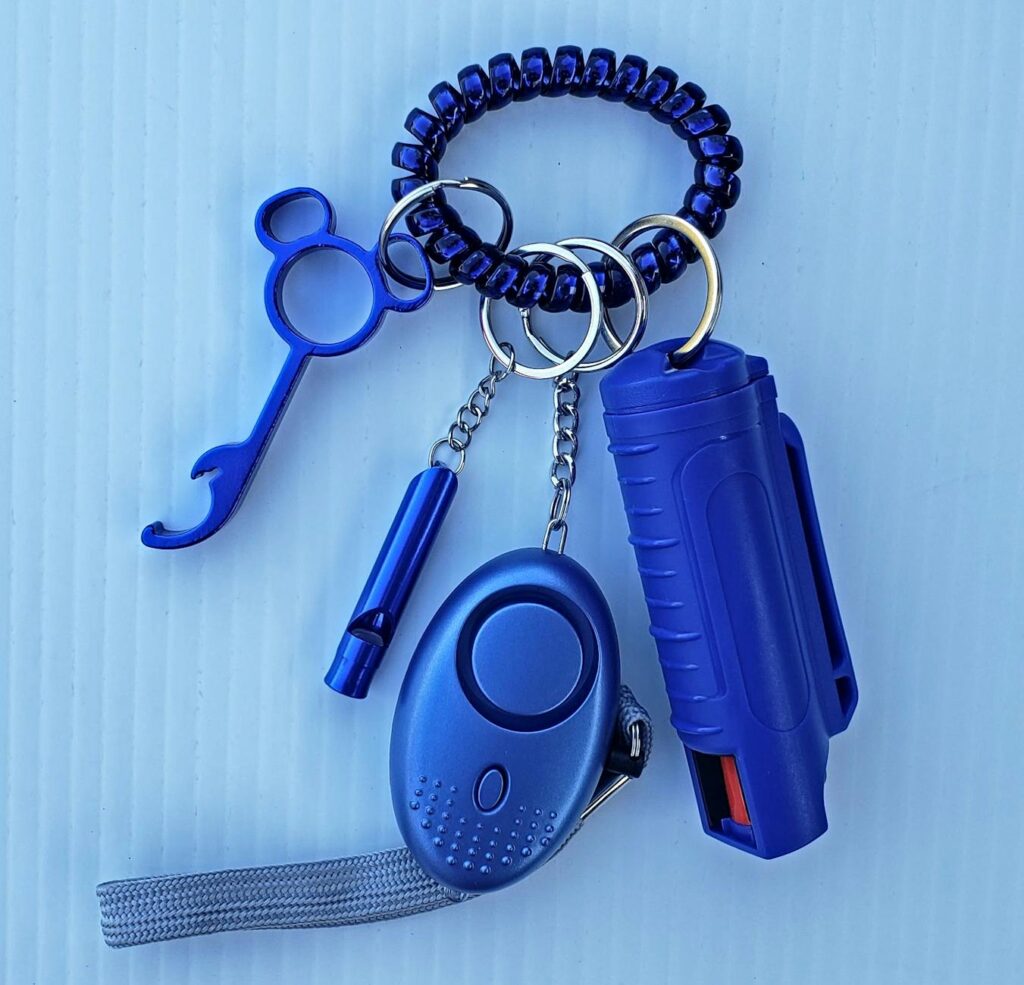Personal safety is a common concern, and keychain self-defense tools are one way you can protect yourself if needed. From pepper spray and kubotans to personal alarms and even tactical keychains, these small devices can help you feel safer.
However, carrying and using self-defense weapons isn’t always straightforward. The legality of self-defense weapons varies from country to country, state to state, and sometimes city to city. What’s acceptable in one jurisdiction may be illegal only a few miles down the road.
If you’re considering carrying a keychain self-defense tool, it’s important to know every legal consideration so you don’t end up facing fines, confiscation, or even criminal charges.
1. Types of Keychain Self-Defense Tools and Their Legal Status
Keychain self defense tools come with different legal restrictions. Due to security regulations, these self-defense tools are prohibited as carry-on items on commercial flights in the United States.
Here are the most common types of keychain self defense tools and their legal status:
Pepper Spray and Mace
Pepper Spray is one of the best keychain self-defense products and is convenient to use and carry around. However, state regulations regarding their use vary. For example, some states, such as New York, restrict the size you should have around. (The state restricts canisters to 0.75 ounces)
Other locations will not ship or allow you to bring pepper spray across state lines. In Washington, D.C., pepper sprays are completely banned unless you have a permit.
Kubotans and Tactical Keychains
Kubotans are small, blunt sticks meant to strike pressure points. A tactical keychain can have hardened edges or a hidden blade. These are usually legal across the U.S., but some states often deem them dangerous if they are sharp or made from metal.
For example, in California and Massachusetts, you cannot carry kubotans in certain places. Kubotans are also classified as offensive weapons in some European countries. That’s why it’s advisable to check their legal restrictions before carrying them when traveling.
Personal Alarms
A personal alarm is intended to shock and disorient an attacker, allowing you time to get away. These devices emit a loud sound likely to disorient an attacker and alert attention. Personal alarms are not capable of causing injury, so there are no legal restrictions on their use in many jurisdictions.
2. State and Local Variations in U.S. Laws
While federal laws establish certain parameters, each state can place additional restrictions or limitations on firearm ownership and usage. Some states allow the open carry of self-defense tools but restrict concealed weapons. For example:
- Texas allows many self-defense tools but limits the concealed carry of a few.
- New York has strict laws on anything labeled “dangerous weapon.”
Even if a self-defense tool is legal, it can still be illegal to carry it in certain places. Some commonly restricted areas include:
- Airports (TSA bans most self-defense tools from carry-on bags).
- Schools and government buildings.
- Public events where weapons are banned.
3. Self-Defense vs. Weapon Classification
One of the biggest factors determining legality is how a tool is classified as a self-defense device or a weapon. For example, some states, including California, look at intent; if a tool is carried with the intent to harm, it can be considered a weapon and may not fall under legal guidance for self-defense tools, even if they are otherwise legal.
4. International Restrictions on Keychain Self-Defense Tools
If you travel frequently, knowing how other countries regulate self-defense tools is important.
- United Kingdom: In the UK, it’s illegal for any public member to carry a lethal or non-lethal self-defense weapon. The police allow a rape alarm as the only fully legal self defense product, and you can purchase it from most local police stations. Carrying self-defense tools, including kubotans or knuckle keychains, can lead to charges.
- Canada: In Canada, alarms and flashlights are legally permissible tools for self-defense. Pepper spray is prohibited for personal use, while kubotans and cat-ear keychains are often confiscated at customs.
3. When Can You Legally Use a Self-Defense Tool?
Carrying a self-defense tool is one thing, but misusing it can still lead to legal trouble. Most jurisdictions follow these principles:
- Proportional force: You can only use the force necessary to stop an attack. For example, if someone grabs your arm, it would be too much to use pepper spray. However, if you’re being physically assaulted, using a kubotan to save yourself would not be considered too much.
- Immediate Threat: You can only use a keychain self-defense tool if there’s an immediate threat to yourself. Simply having it on you doesn’t guarantee the right to use it in anticipation or when there’s no real danger.
5. Duty to Retreat vs. Stand Your Ground
Some states have clearly outlined laws requiring you to adhere to the “duty to retreat” if you can before using force. Others have “stand your ground” statutes that say you do not have to run. New York and Massachusetts are two common states with duty-to-retreat laws, while Florida, Texas, and Georgia belong to the category of Stand Your Ground States.
Knowing the laws where you live can help you make legally sound self-defense choices.
Final Thoughts
While keychain self-defense tools can be effective means of protecting yourself, their legality isn’t always clear-cut. What is considered legal in one state could easily land you a felony charge in another.
Laws differ from state to state and country to country; they can sometimes even vary from location to location within the same city. Before you decide to carry any form of legal self-defense tool, be sure to familiarize yourself with the laws in your jurisdiction.
As always, carry keychain self-defense tools that are legal where you live and travel and use them responsibly—only when justified under the law.

